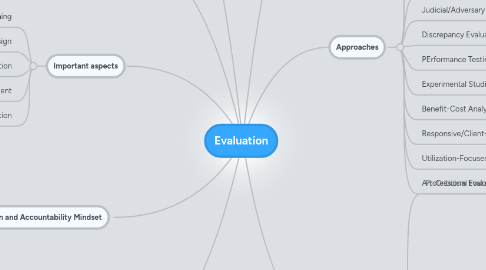
1. Evaluation and Accountability Mindset
1.1. Attitude if a Chief evaluation and Accountability Officer
1.2. Multidimensional Approach
1.3. Simple is better
1.4. Technological perspective
1.5. Research-Based
2. Data
2.1. Frequency
2.2. Observations
2.3. Surveys
2.4. Focus Groups
2.5. Interview
2.6. Mean, Mode, median
2.7. Quantitative vs. Qualitative
3. Important aspects
3.1. Planning
3.2. Design
3.3. Implementation
3.4. Management
3.5. Communication/Interaction
4. Implications of Evaluation
4.1. Implication
4.1.1. "A close connection"
4.2. Consequence
4.2.1. "Something produced by a cause or necessarily following from a set of conditions"
4.3. Outcome
4.3.1. "Something that follows as a result or consequence"
4.4. Impact
4.4.1. "To have a direct effect"
5. Process
5.1. Identifying stakeholders
5.2. Planning the program
5.3. Preparing for the evaluation
5.4. Locating software
5.5. Engaging in follow-up visits
5.6. Creating and testing data collection instruments
5.7. Sharing the findings
6. Logic Models
6.1. Resources/inputs
6.2. Activities
6.3. Outputs
6.4. Outcomes/Impacts
6.5. Definitions
6.5.1. Simplified picture of a program
6.5.2. Visual method presenting an idea
6.5.3. Strategic plan represented for the implementation process of the evaluation
7. Approaches
7.1. CIPP Evaluation Model
7.2. Kirkpatricks Four Levels of Evaluation
7.3. Goals-Oriented/Objectives Based
7.4. Goals Free Evaluation
7.5. Judicial/Adversary Evaluation
7.6. Discrepancy Evaluation Model
7.7. PErformance Testing
7.8. Experimental Studies
7.9. Benefit-Cost Analysis
7.10. Responsive/Client-Centered Evaluation
7.11. Utilization-Focused Evaluation
7.12. Art-Criticism Evaluation Model
8. Discprencies
8.1. Professional Foundations
8.1.1. Communicate effectively in written, oral and visual form
8.1.2. Establish and maintain professional credibility
8.1.3. Demonstrate effective interpersonal skills
8.1.4. Observe ethical and legal standards
8.1.5. Demonstrate awareness of the politics of evaluation
8.2. Planning and Designing the Evaluation
8.2.1. Develop an effective evaluation plan
8.2.2. Develop a management plan for the evaluation
8.2.3. Devise data collection strategies to support the evaluation questions and design
8.2.4. Pilot test the evaluation design and procedures
8.3. Implementing the Evaluation Plan
8.3.1. Collect data
8.3.2. Analyze and interpret data
8.3.3. Disseminate and follow up on the findings and recommendations
8.4. Managing the Evaluation
8.4.1. Monitor the management plan
8.4.2. Work effectively with personnel and stakeholders
